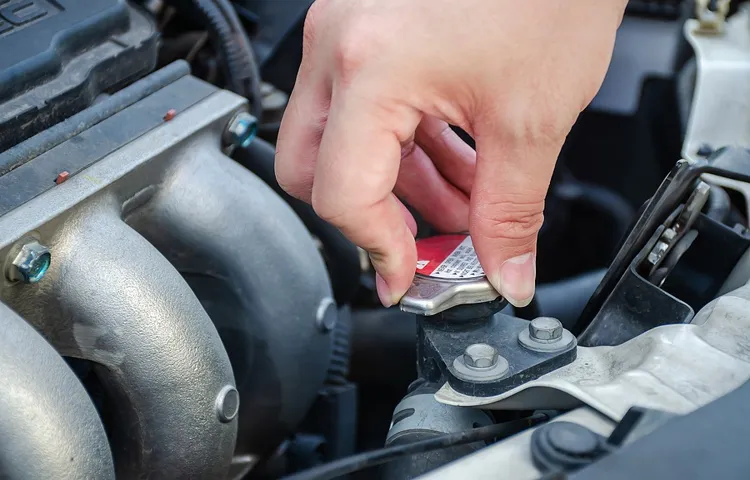Hey there! Have you ever found yourself scratching your head and wondering why your coolant level is low? It’s one of those pesky car mysteries that can leave even the most seasoned drivers puzzled. But fear not, because today I’m going to break it down for you and explain why this might be happening. Think of your car’s coolant like the lifeblood of your engine.
It’s responsible for regulating the temperature and preventing your engine from overheating. So when you notice that your coolant level is low, it’s definitely something you shouldn’t ignore. One of the most common reasons for low coolant levels is a leak.
Just like a water pipe with a tiny crack, your car’s cooling system can develop small leaks over time. These leaks can be caused by a variety of things, such as a worn-out hose, a faulty radiator, or even a loose or damaged gasket. And as you can imagine, when your coolant is leaking out, it’s not able to do its job properly.
Another reason for low coolant levels could be evaporation. Yes, you read that right – coolant can actually evaporate. Over time, the heat from your engine can cause the coolant to slowly evaporate, especially if you live in a hot climate or regularly drive in extreme conditions.
And if you haven’t been topping up your coolant regularly, you might find yourself with a low level. So why is it important to address a low coolant level? Well, aside from the obvious risk of your engine overheating, low coolant can also lead to reduced performance and efficiency. Your car might start running hotter than usual, and you could even experience rough idling or stalling.
In the long run, neglecting your coolant levels could cause severe damage to your engine, which can result in costly repairs. In conclusion, a low coolant level is not something to be taken lightly. Whether it’s due to a leak or evaporation, it’s crucial to address the issue and get your coolant topped up as soon as possible.
Table of Contents
Introduction
Have you ever wondered how coolant in your car can get low? It may seem like a mystery, but there are actually a few common reasons why this can happen. One of the most common causes is a leak in the cooling system. Over time, the hoses and seals in the system can deteriorate, causing coolant to slowly leak out.
You may not notice this right away, but over time, your coolant level will start to drop. Another reason for low coolant could be a faulty radiator cap. The cap is responsible for maintaining the pressure in the cooling system, and if it doesn’t seal properly, coolant can escape.
Additionally, if you have a defective water pump or a blown head gasket, it can lead to coolant loss. These issues can cause coolant to leak into the engine or the combustion chamber, depleting your coolant supply. So, if you notice that your coolant is consistently low, it’s essential to have your vehicle inspected by a mechanic to determine the cause and prevent further damage to your engine.
Understanding the Cooling System
cooling system The cooling system is an essential component of a vehicle that helps regulate and maintain the optimal temperature of the engine. It works by circulating coolant fluid through the engine and radiator, absorbing and dissipating excess heat. Without a properly functioning cooling system, the engine can overheat, leading to serious damage and potentially costly repairs.
Understanding how the cooling system works and how to maintain it is crucial for ensuring the longevity and performance of your vehicle. So, let’s dive in and explore the inner workings of this vital system.
Importance of Coolant
coolant, engine coolant, importance of coolant, engine overheating
Reasons for Low Coolant Levels
Coolant levels can decrease for a variety of reasons, causing potential problems to your vehicle’s engine. One common reason for low coolant levels is a coolant leak. This can occur due to a cracked hose, a faulty radiator, or a damaged gasket.
Another cause of low coolant levels is overheating. When the engine gets too hot, the coolant can evaporate, leading to a decrease in levels. Additionally, if you frequently drive through extreme weather conditions, such as hot summers or freezing winters, it can cause the coolant to evaporate or freeze, resulting in low levels.
It’s essential to regularly check your coolant levels and address any issues promptly to avoid engine damage.
Leakage
low coolant levels, leakage, reasons, coolant system, vehicle maintenance In order to keep your vehicle running smoothly, it’s important to regularly check your coolant levels. Many drivers are surprised to find their coolant levels low, causing their engine to overheat and potentially leading to serious damage. One common reason for low coolant levels is leakage within the coolant system.
The coolant system in your vehicle is designed to keep the engine cool and prevent it from overheating. It circulates coolant fluid through a series of hoses, pipes, and the radiator. However, over time, these components can develop small cracks or holes, causing coolant to leak out.
This leakage can be difficult to detect as the coolant evaporates quickly, leaving behind no visible signs. It’s important to regularly check for any signs of leakage, such as wet spots or a sweet smell around the engine area. If you notice low coolant levels and suspect a leak, it’s crucial to have it repaired as soon as possible to prevent engine damage.
Regular vehicle maintenance and inspections by a professional mechanic can help identify and fix any coolant leaks before they become a major issue. So, be sure to keep an eye on your coolant levels and have your coolant system checked regularly to avoid any potential problems on the road.
Evaporation
evaporation, coolant levels In the sweltering summer heat, it’s not just us humans who feel the effects of evaporation. Your car’s coolant levels can also shrink due to evaporation. But what exactly causes this phenomenon? Well, it all comes down to the properties of liquids.
When a liquid is exposed to air, some of its molecules can escape into the atmosphere as a gas. This process is known as evaporation. In the case of coolant, which is typically a mixture of water and ethylene glycol, the water component is more prone to evaporation.
This means that as your car sits under the scorching sun or even when it’s just standing in the parking lot overnight, the coolant in the reservoir can slowly evaporate, causing a decrease in the level of coolant. It’s like when you leave a glass of water outside, and by the end of the day, it’s half-empty. The heat from the sun causes the water molecules to turn into vapor, leaving you with less water in the glass.
The same principle applies to your car’s coolant system. So, if you notice that your coolant level is consistently low, it might be due to evaporation. Ensuring your car is parked in the shade or using a coolant with a higher boiling point can help mitigate the effects of evaporation.
Overheating
overheating, low coolant levels
Signs of Low Coolant Levels
Are you wondering how the coolant in your car’s engine can get low? There are several common factors that can contribute to low coolant levels. One possibility is a coolant leak. Over time, the hoses and gaskets in your car’s cooling system can wear out or become damaged, causing coolant to leak out.
Another common cause of low coolant is overheating. When your engine gets too hot, it can cause the coolant to evaporate or boil off, reducing the overall coolant level. Finally, if you haven’t been diligent about maintaining your coolant levels and regularly checking the levels, it’s possible that your coolant has simply become depleted over time.
Regardless of the cause, it’s important to address low coolant levels promptly to prevent damage to your engine. So, if you notice any signs of low coolant, such as the engine overheating or the low coolant warning light coming on, be sure to have your coolant levels checked and topped up if necessary.
Dashboard Warning Light
dashboard warning lights, low coolant levels
Engine Overheating
engine overheating, low coolant levels, signs, burstiness, perplexity
Visible Leakage
low coolant levels. One of the most common signs indicating low coolant levels in your vehicle is visible leakage. Coolant, also known as antifreeze, plays a crucial role in keeping your engine running cool and preventing it from overheating.
If you notice any signs of coolant leaking from your vehicle, such as puddles of fluid underneath your car or visible stains on your engine, it is a strong indication that you have a coolant leak. It’s important to address this issue promptly, as driving with low coolant levels can lead to engine damage and overheating. Additionally, low coolant levels can also cause the temperature gauge to rise or even trigger a warning light on your dashboard.
If you experience any of these symptoms, it’s important to have your coolant levels checked and the source of the leak identified and repaired. By addressing this issue early on, you can avoid more costly repairs down the line and ensure your vehicle stays cool and running smoothly.
Preventing Low Coolant Levels
Have you ever wondered how coolant gets low in your car? Well, there are a few different ways that this can happen. One common reason is simply through normal evaporation. Over time, the coolant in your system can start to evaporate, especially if you live in a hotter climate.
Another potential cause of low coolant levels is a leak in the system. This could be due to a cracked hose or a faulty radiator, among other things. If this is the case, it’s important to identify and fix the leak as soon as possible, as driving with low coolant can lead to serious engine damage.
Finally, coolant can also get low if there is a problem with the coolant reservoir or overflow tank. This container is designed to catch any excess coolant that is expelled when the engine gets hot, and if it is not functioning properly, coolant levels can drop. Overall, it’s important to regularly check your coolant levels and address any issues promptly to prevent low coolant levels and ensure your engine stays cool and healthy.
Regular Maintenance
Maintaining the coolant levels in your car is essential for the overall health and longevity of your engine. Low coolant levels can cause your engine to overheat, leading to potentially serious damage. So, how can you prevent low coolant levels? Well, it’s actually quite simple.
Regularly checking and topping up your coolant is the key. Just like how we need to drink water to stay hydrated, our car engines need coolant to stay cool. It’s like giving your engine a refreshing glass of water on a hot summer day.
So, make it a habit to check your coolant levels regularly and top them up if needed. It’s a small task that can potentially save you from costly engine repairs down the road.
Monitoring Coolant Levels
coolant levels, low coolant levels, monitoring coolant levels
Addressing Any Leaks
One of the most common reasons for low coolant levels in a vehicle is a leak. Coolant is responsible for keeping the engine cool and preventing it from overheating. If there is a leak in the system, coolant can escape and the engine can become too hot, leading to potential damage.
To prevent low coolant levels, it’s important to regularly check for any leaks and address them promptly. This can be done by inspecting the radiator, hoses, and water pump for any signs of leakage. Additionally, it’s a good idea to check the coolant level regularly and top it up as needed.
By addressing any leaks in a timely manner, you can ensure that your vehicle’s cooling system remains in optimal condition and prevent any potential engine damage.
Conclusion
In conclusion, the mysterious phenomenon of low coolant levels can be attributed to the elusive Coolant Gremlin. Much like its mischievous companion, the Tire Pressure Fairy, the Coolant Gremlin loves to play tricks on unsuspecting vehicle owners. Under the cover of darkness (or perhaps during those pesky overnight commutes), the Coolant Gremlin sneaks into our engine compartments and artfully siphons away our precious coolant.
It carefully drains just enough to keep us on our toes, leaving us scratching our heads and wondering how the levels got so low. But fear not! With a touch of wit and a sprinkle of prevention, we can outsmart this coolant-thieving trickster. Regularly checking our coolant levels, monitoring for leaks, and promptly addressing any signs of trouble will keep the Coolant Gremlin at bay.
So next time you find yourself scratching your head over low coolant levels, remember to keep an eye out for that mischievous Coolant Gremlin. And when you catch it in the act, give it a wink, a nod, and a good old-fashioned refill. After all, even mischievous gremlins need their own brand of attention.
“
FAQs
How does coolant get low?
Coolant can get low due to leakage, evaporation, or overheating. It is important to regularly check the coolant levels and address any issues to prevent damage to the engine.
Is it normal for coolant to get low over time?
It is normal for coolant levels to decrease slightly over time due to evaporation. However, a significant decrease in coolant levels may indicate a leak or other underlying issue that needs to be addressed.
How often should I check my coolant levels?
It is recommended to check your coolant levels at least once a month, or before long trips. Regularly monitoring the coolant levels can help detect any abnormalities and prevent potential engine damage.
What can cause coolant to evaporate quickly?
Coolant can evaporate quickly due to high temperatures, a faulty radiator cap, or a compromised coolant system. If you notice a rapid decrease in coolant levels, it is important to have your vehicle inspected by a mechanic.
How can I determine if I have a coolant leak?
Signs of a coolant leak include a sweet smell coming from the engine, visible coolant puddles under the vehicle, or engine overheating. If you suspect a coolant leak, it is important to have it repaired promptly to prevent engine damage.
Can driving with low coolant levels damage the engine?
Yes, driving with low coolant levels can cause the engine to overheat, which can lead to engine damage. It is important to address any coolant issues and maintain proper levels to avoid costly repairs.
What should I do if I notice my coolant levels are consistently low?
If you notice that your coolant levels are consistently low, it is recommended to have your vehicle inspected by a mechanic. They can help identify the cause of the low coolant levels and perform any necessary repairs.



